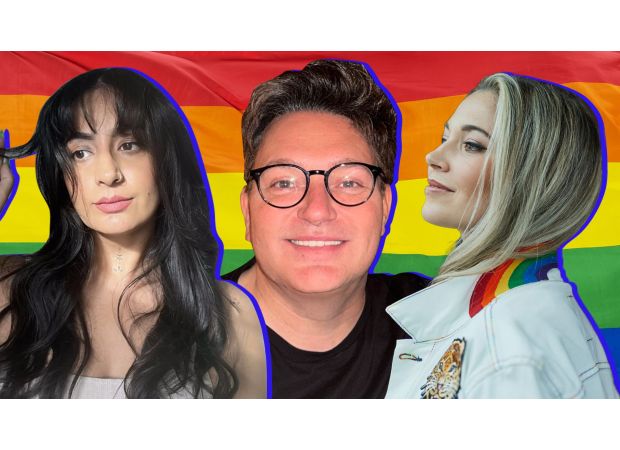The term queer carries personal significance for us.
We spoke with LGBTQ+ individuals to understand their interpretation of the term 'queer'.

Metro recently spoke with members of the LGBTQ+ community to discuss the word 'queer' and its meaning to us. It's fascinating how language can evolve and change, as seen with the word 'wicked' which went from describing evil acts to being a positive affirmation. Changes in definition like this often reveal a person's generation, but it can also cause conflict and divide between generations, as seen with the word 'queer'.
Recently, there has been a debate about the use of the word 'queer' after it was used in a piece about the nominations for the 2025 Metro Pride Awards. A reader named Derek from Gospel Oak expressed his dislike for the word, calling it "the most vile word." It's clear that the word still holds painful connotations for some members of the LGBTQ+ community, while others have reclaimed it as a term of empowerment and activism.
As a writer, author, and founder of Middlesex Pride, Sharan Dhaliwal shares her personal journey with the word 'queer'. She initially identified as bisexual, but the term never felt quite right to her. After starting her own LGBTQ+ speed dating event called 'Oh Queer Cupid', she began using the word more and more and learned about its political history. For Sharan, 'queer' is a political statement that challenges societal norms.
During one of her events, an older dater questioned Sharan's use of the word 'queer'. This sparked a deep discussion about its history and how it has been reclaimed by younger generations. It was during this conversation that someone said, "We've taken it back, but with respect. We're still fighting alongside you, we're not forgetting you." This statement resonated with Sharan, and she now feels a sense of strength and community when using the word 'queer'.
Aubrey Crawley, an LGBTQ+ Officer for Labour and founder of West London Queer Project, also shares his experience with the word 'queer'. He was approached by an older woman who was offended by the use of the word in his organization's name, as it had been used as a slur against her in the past. Aubrey understands the hurt and anger that can be associated with the word, having grown up in South Africa during a time when it was used to discriminate against the LGBTQ+ community.
Despite the word's painful history, both Sharan and Aubrey have found empowerment and strength in reclaiming it. Sharan describes it as a "love that [she] desperately needed" and Aubrey sees it as a way to honor the struggle of past generations while fighting for a better future. As Aubrey puts it, "I'm queer, and there's nothing you can do to change that."
In recent years, the word ‘queer’ has undergone a significant change in meaning and usage. It went from being a hurtful slur, used to oppress and marginalize the LGBTQ+ community, to being a term of empowerment and pride for many within the community. This evolution in definition is reflective of the generational changes and conflicts within the community.
For those from older generations, words like ‘queer’ and ‘wicked’ have different connotations due to the time period in which they grew up. These words may have once been used to harm and belittle the LGBTQ+ community, but they have now been reclaimed and used as a means of self-expression and defiance.
However, not everyone within the community is ready to embrace these changes. Some, like Derek from Gospel Oak, still hold onto the pain and trauma associated with the word ‘queer’. As Metro speaks to members of the LGBTQ+ community, it is evident that there is a divide between those who have reclaimed the word and those who are still healing from its past usage.
For writer and founder of Middlesex Pride, Sharan, the word ‘bisexual’ never felt like it fully represented her identity. She eventually found comfort and solidarity in the word ‘queer’ and has even used it in her own LGBTQ+ speed dating event. Similarly, for LGBTQ+ Officer Aubrey, the word ‘queer’ holds a sense of empowerment and unity within the community.
But for older members of the community, like the 60-something lesbian who confronted Aubrey at a festival, the word ‘queer’ still holds negative connotations. It is a reminder of the pain and discrimination they have faced in the past. While some may have reclaimed the word, others are still grappling with its complexities and the harm it once caused.
Despite this divide, there is a sense of understanding and respect within the community. As one participant in Sharan’s speed dating event put it, “We’ve taken it back, but with respect. We’re still fighting alongside you, we’re not forgetting you.” The word ‘queer’ may have once been a source of division, but it is now a symbol of resilience and unity within the LGBTQ+ community.
For Aubrey, the word ‘queer’ represents a powerful statement of self-acceptance and defiance. As someone who grew up in a time where the word was used as a slur, they have chosen to reclaim it and wear it as a badge of honor. It is a reminder that despite the pain and discrimination, they are proud of who they are and will continue to fight for their rights.
In the end, the word ‘queer’ means different things to different people in the LGBTQ+ community. It is a reflection of the generational changes and conflicts within the community, but it is also a symbol of resilience, empowerment, and unity. And as long as there is understanding and respect within the community, the word will continue to evolve and hold different meanings for each individual.
21 Views




